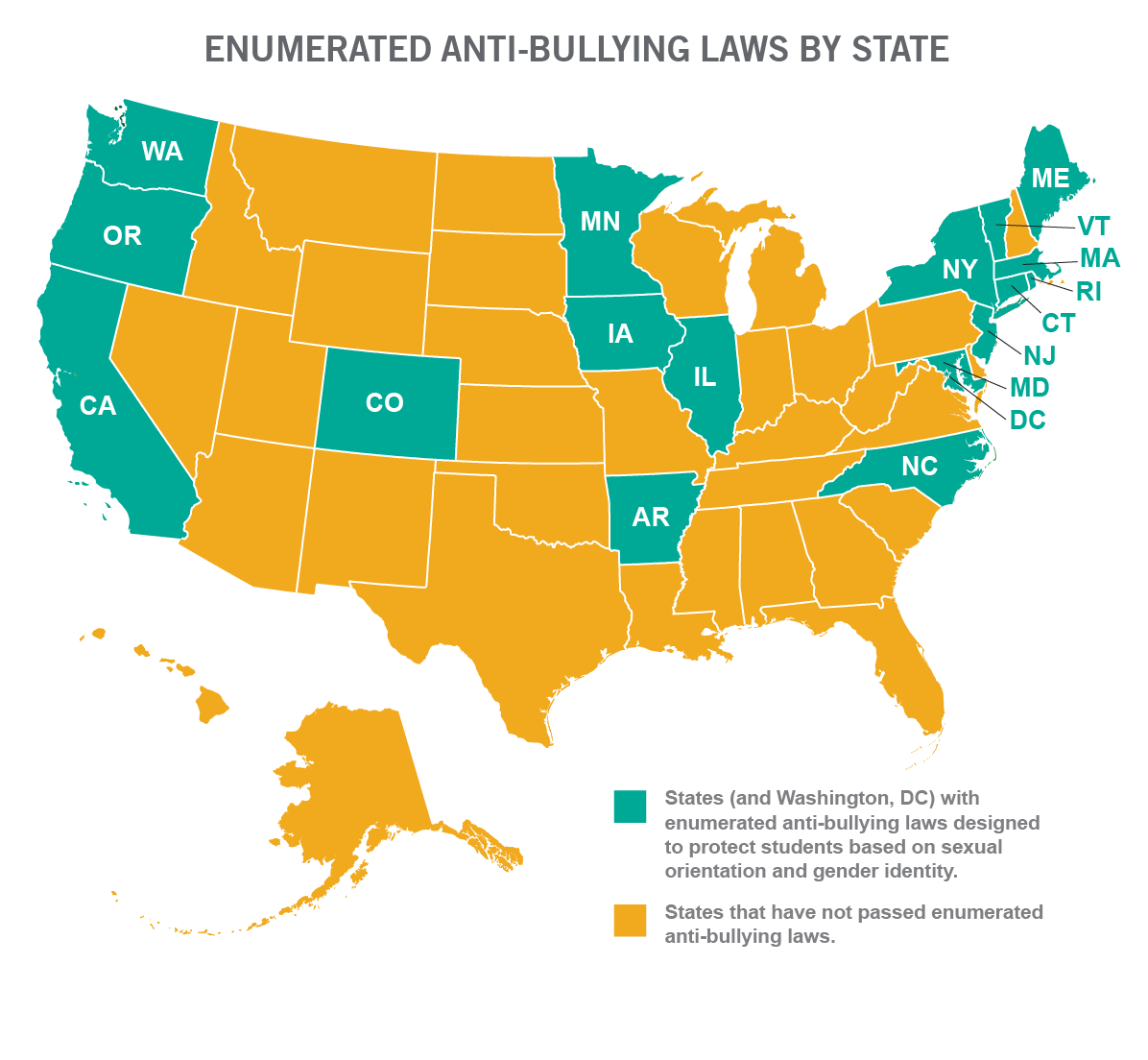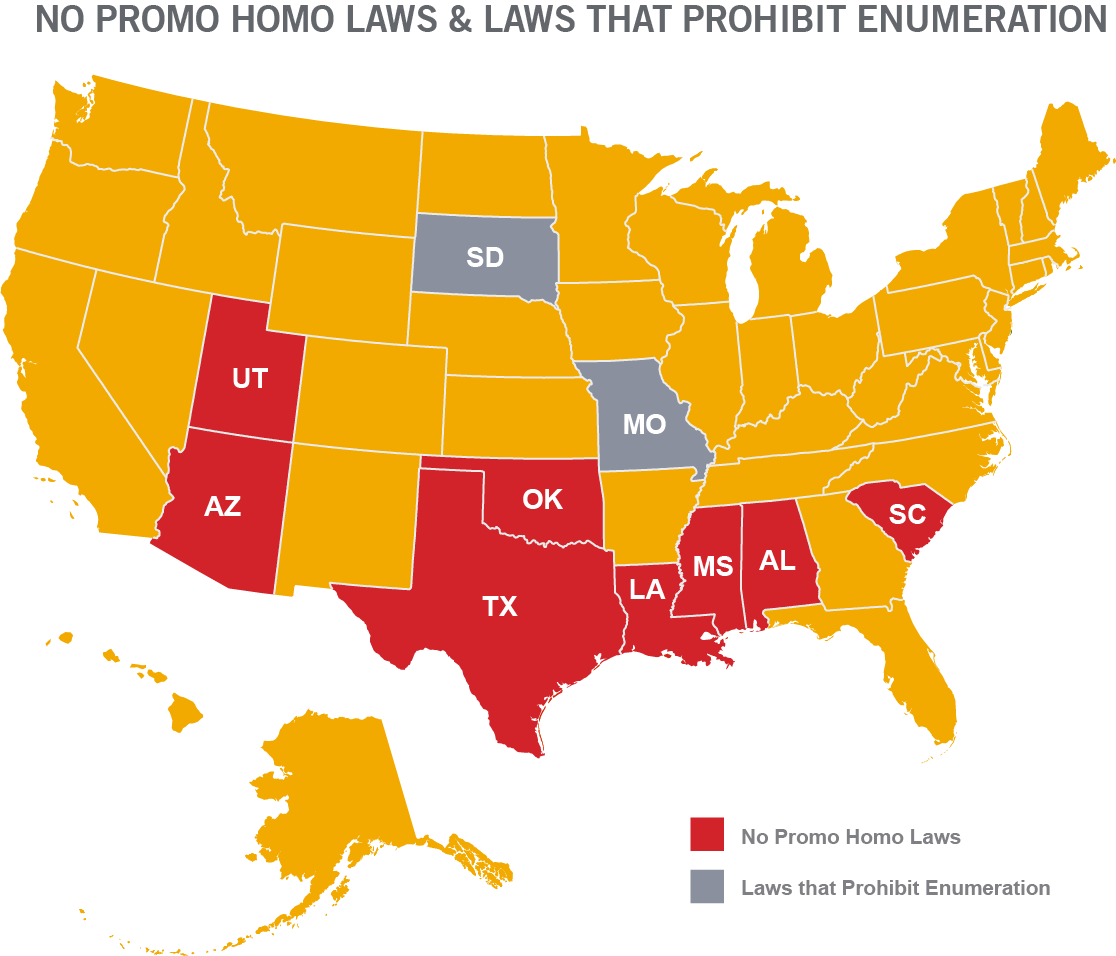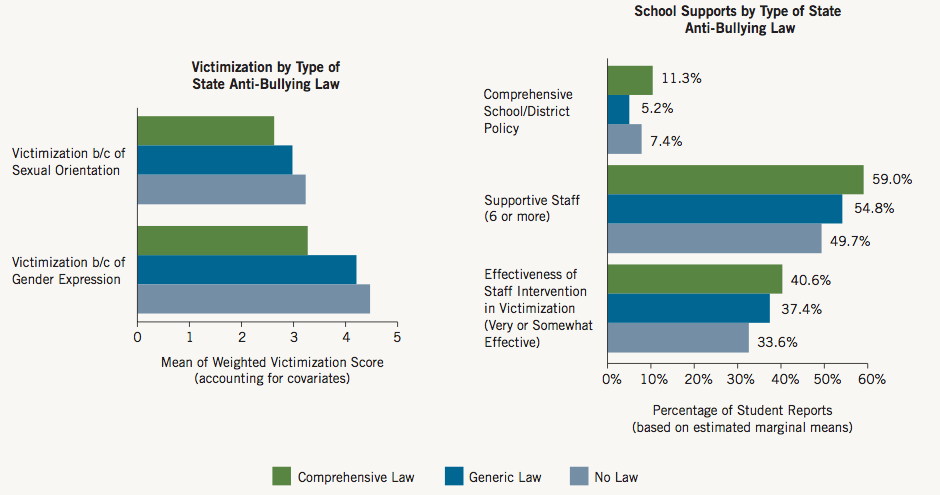Gay, lesbian, bisexual, and transgender students often face a lot of turmoil and outright discrimination in high school. It is still legal in many parts of the country for school staff to discriminate against LGBT students, and anti-LGBT bullying is still very common in American schools. This discrimination is one reason for the considerably higher suicide rates among LGBT youth.
Some LGBT groups, led by the Gay, Lesbian, and Straight Education Network (GLSEN), are trying to do something about the discrimination. By pushing for state and federal laws that target bullying and discrimination in schools — and against laws that don't allow school staff to even discuss LGBT issues — advocates hope to reduce decades of bullying.
Some of that push is taking place at the state level, where LGBT advocates are asking legislators to add protections for LGBT students to existing anti-bullying laws and create new protections through new non-discrimination statutes. At the federal level, LGBT groups and other anti-bullying advocates are pushing for the Safe Schools Improvement Act and the Student Non-Discrimination Act.
So far, advocates have made gains in some states. But as they continue their efforts, a big question remains: how successful are these laws, really?
Most states don't include LGBT people in anti-bullying laws

(GLSEN)
The green states in the map above explicitly include LGBT people in anti-bullying laws, which require schools to set up policies that combat bullying. These programs try to ensure that all kinds of bullying go punished, but by including protections for specific groups that face more bullying, such as LGBT students, school staff are further encouraged to defend more vulnerable populations.
Most states don't have non-discrimination laws for LGBT students
 (GLSEN)
(GLSEN)
Beyond anti-bullying laws, non-discrimination laws forbid any kind of discrimination against LGBT students — most notably, from staff — in schools. Under these laws, students must be allowed to take part in school clubs, activities, and events, such as prom, regardless of their sexual orientation, gender expression, or gender identity.
Eight states don't let schools discuss LGBT issues
 (GLSEN)
(GLSEN)
"No promo homo" laws, as GLSEN calls them, forbid school staff from discussing LGBT issues, including sexual health and HIV/AIDS awareness, in a positive light, if at all. Many of these laws were passed in the 1980s and 1990s in response to the HIV scare and the anti-gay attitudes the epidemic fostered, but recently some state legislators, such as in Tennessee and Missouri, have pushed similar "don't say gay" laws.
Two states — Missouri and South Dakota — also forbid enumeration, which means LGBT people and other specific groups can't be explicitly named and protected by existing anti-bullying laws.
Do anti-bullying and non-discrimination laws work?
Based on GLSEN's research and broader studies into anti-bullying laws, it seems these policies have some positive impact.
(GLSEN)
It's possible that some of these numbers reflect more tolerant environments in certain states. If a state legislature has the political support to pass laws that protect LGBT students, the state's residents might be more likely to take action against anti-gay or transphobic discrimination regardless of the law.
But Eliza Byard, executive director of GLSEN, says her organization's research controls for those factors. She points out that her group found better reports from LGBT students in Arkansas and North Carolina, two states that aren't traditionally associated with LGBT-friendly environments, after they passed comprehensive laws protecting LGBT students.
Still, Byard acknowledges the various factors that can affect how well these laws work. "We are talking about a really important ecosystem in the life of a student everyday," she says. "What's their school like? How well-trained are their teachers? How much support does their school have in functioning as a safe and welcoming environment outside of LGBT issues? There are a lot of factors here that come into play."
Elizabeth Englander, a bullying researcher at Bridgewater State University and director and founder of the Massachusetts Aggression Reduction Center, characterizes the implementation of these laws as a good first step.
"If the goal is to convey through the passage of a law that this is a behavior that matters to us, … just passing the law and the publicity surrounding the law are helpful," Englander says. "The general rise in awareness around the issue tends to filter down to kids."
Beyond the law itself, Byard and Englander say it's important to ensure anti-bullying laws are well-resourced.
Based on Englander's research, attaching education programs to anti-bullying laws can make them more effective. Without those education measures, teachers and other staff might not be clear on what, exactly, they're supposed to do when faced with a student complaining about bullying or discrimination.
Byard, meanwhile, explains it's important that schools actually have the resources and accountability measures to enforce the anti-bullying policies they implement. "In our ideal model, there are resources for providing professional development to teachers and educators so that they are prepared to implement the law effectively," Byard says. "We also look for incident reporting requirements, so there's an ability to track what's actually happening on the ground."
Under the proper settings and policies, these laws can make a good first step. But to fully address the mental health problems that are far too common among LGBT youth, America will need to take steps beyond lawmaking.
